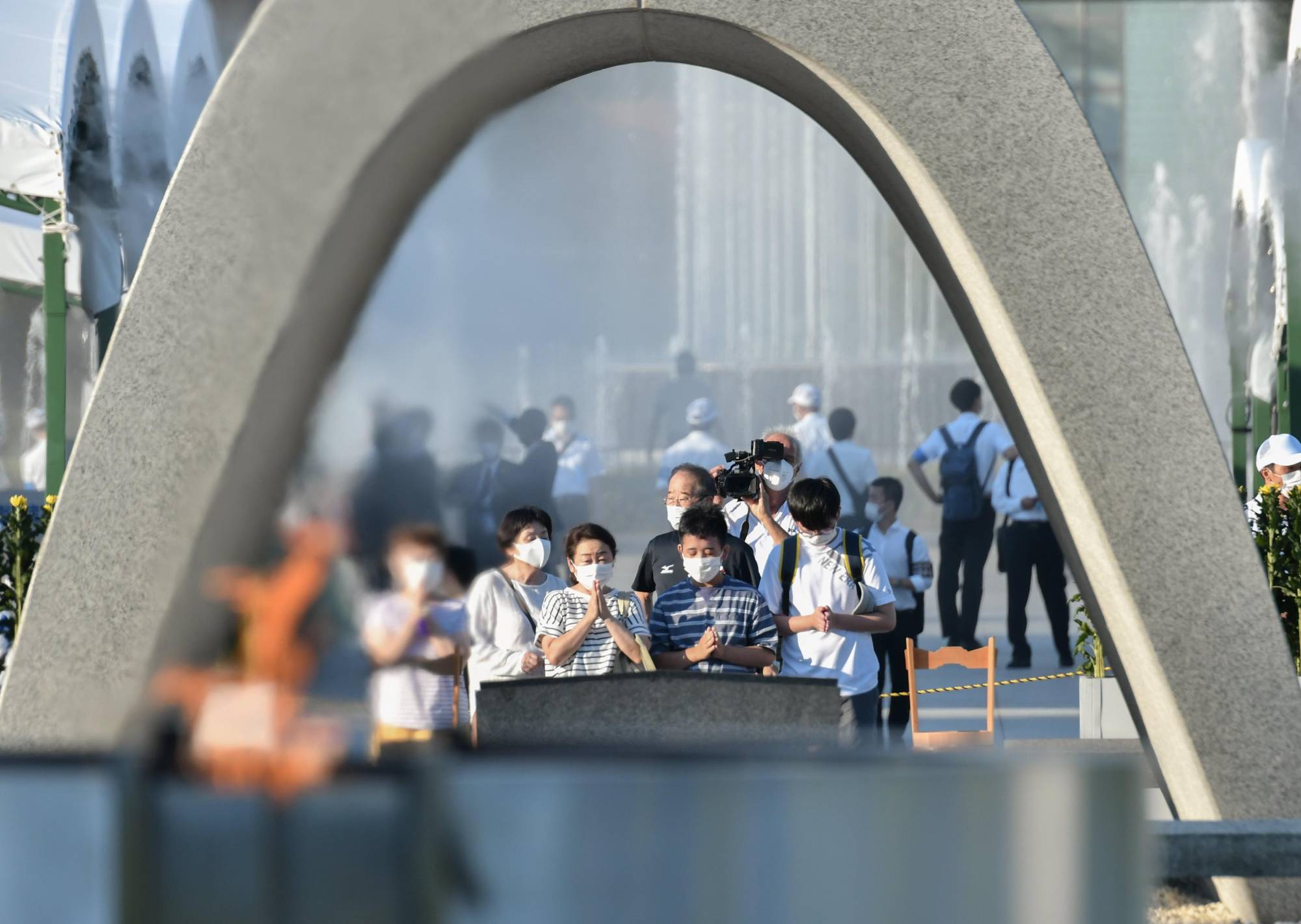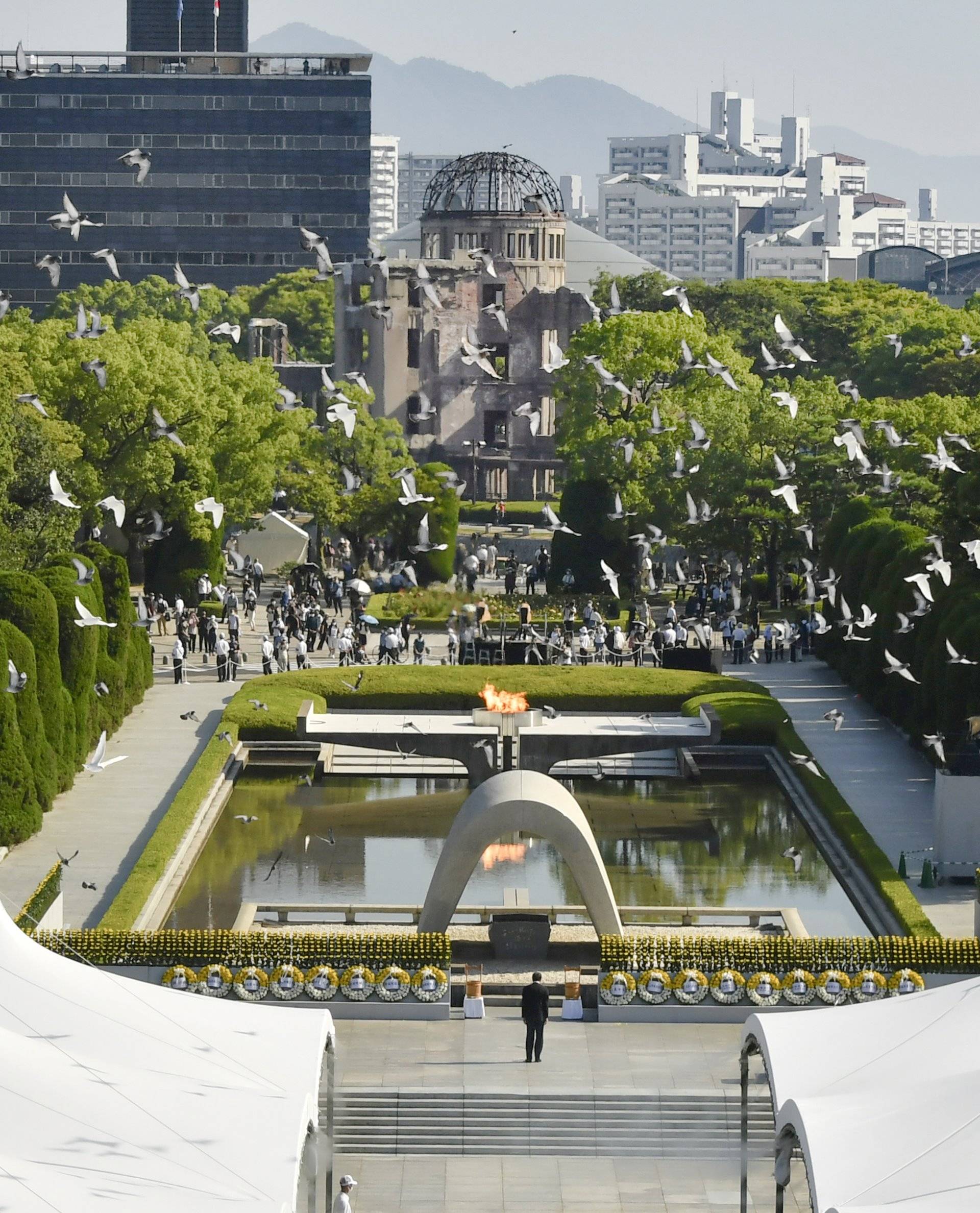Hiroshima – Hiroshima on Friday marked the 76th anniversary of the atomic bombing by the United States, with its mayor urging world leaders to shift away from nuclear deterrence to trust-building dialogue.
In the annual ceremony, which was scaled down once again this year amid surging coronavirus infections across Japan, Hiroshima Mayor Kazumi Matsui called on world leaders to support a U.N. treaty to ban nuclear weapons that came into effect this January.
After a moment of silence was observed at 8:15 a.m., the exact time of the bombing on Aug. 6, 1945, the mayor also highlighted the significance of combining individual efforts, particularly among youth, to encourage nuclear-armed states to change their policies.
“The road to abolition will not be smooth, but a ray of hope shines from the young people now taking up the hibakusha’s quest,” he said, referring to survivors of the atomic bombings in Hiroshima and Nagasaki, whose numbers have been decreasing rapidly due to their old age.
Matsui stressed that his city would never stop preserving the facts of the catastrophe and would continue to promote a worldwide culture of peace.
“Nuclear weapons are the ultimate human violence. If civil society decides to live without them, the door to a nuclear-weapon-free world will open wide,” he said.
In a speech at the event, Prime Minister Yoshihide Suga stressed the need for “realistic initiatives” toward nuclear disarmament amid the severe security environment and widening differences between nations’ positions.

At the ongoing Tokyo Olympics, athletes and officials were not asked to observe a moment of silence despite requests from the Hiroshima Municipal Government and other groups for them to participate “in spirit.”
The requests were made after International Olympic Committee President Thomas Bach visited Hiroshima on July 16, a week before the opening of the Olympics. During his visit, Bach called for global solidarity in building a more peaceful future.
As for the U.N. treaty to ban nuclear weapons, which currently has 86 signatory states, Matsui called for the Japanese government to sign and ratify it in order to carry out “productive mediation” between nuclear and non-nuclear-weapon states.
Japan has refused to participate in the Treaty on the Prohibition of Nuclear Weapons along with the world’s nuclear-weapon states as it sits under the U.S. nuclear umbrella.
Suga, attending the ceremony for the first time as prime minister, did not refer to the new treaty in his speech but said the government would continue to strive to make the next Nuclear Non-Proliferation Treaty review conference fruitful by finding common ground between countries.
“Japan, as the only country that has suffered atomic bombings in war, understands the inhumanity of nuclear weapons better than any other nation, so it is important for us to make steady efforts toward the realization of a world free of nuclear weapons,” he said.



In a video message, U.N. Secretary-General Antonio Guterres, who decided to once again forgo attending the ceremony due to the pandemic, said, “The only guarantee against the use of nuclear weapons is their total elimination.”
The number of guests with seats was limited to around 880, less than 10% of those in usual years.
The city said officials from 86 nations and the European Union would attend the ceremony.
A uranium-core atomic bomb dubbed “Little Boy,” dropped by a U.S. bomber, exploded above the city at 8:15 a.m. on Aug. 6, 1945, killing an estimated 140,000 people by the end of that year.
A second atomic bomb was dropped on Nagasaki on Aug. 9, and Japan surrendered six days later, marking the end of World War II.
The combined number of surviving victims of the two atomic bombings stood at 127,755 as of March, down about 8,900 from a year earlier, the Ministry of Health, Labor and Welfare said, adding that their average age was 83.94.
In a time of both misinformation and too much information, quality journalism is more crucial than ever.
By subscribing, you can help us get the story right.
SUBSCRIBE NOW


